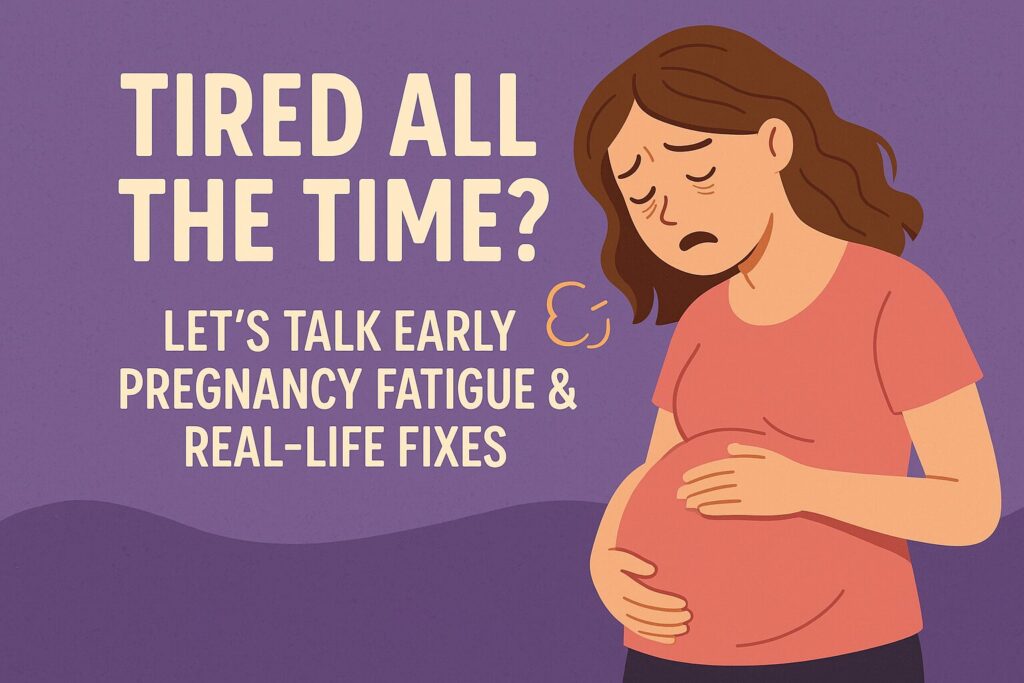When that pregnancy test showed those two pink lines, you probably imagined the glow, the cute baby bump, and the exciting nursery planning. What you might not have anticipated was feeling like you’ve been hit by a truck before you’ve even had breakfast. As a midwife who’s guided thousands of women through pregnancy—and as a mom who’s personally weathered the fatigue storm five times over—I’m here to tell you that pregnancy fatigue is real, and there are ways to navigate this exhausting chapter of your journey.
Why Am I So Incredibly Tired? Understanding Early Pregnancy Fatigue
Let me paint you a picture: it’s 2 PM, you’re at your desk at work, and suddenly it feels like your eyelids weigh a thousand pounds. Or perhaps you’ve canceled plans with friends three weekends in a row because the thought of getting dressed seems as challenging as climbing Mount Everest. Sound familiar?
First, know this: you’re not being lazy, and you’re certainly not alone. Pregnancy fatigue is real—it’s one of the earliest and most common pregnancy symptoms, often appearing even before that missed period.
The Science Behind Your Exhaustion
Your body isn’t just feeling tired—it’s working overtime. During those first weeks of pregnancy:
- Your metabolism kicks into high gear
- Your blood volume begins increasing dramatically
- Your hormone levels—particularly progesterone—skyrocket
- Your body is manufacturing an entirely new organ (the placenta)
- Your little one’s heart, brain, and other vital organs are forming
According to research from the Mayo Clinic, progesterone—that drowsiness-inducing hormone—can be 10 times higher during early pregnancy than during your normal menstrual cycle. No wonder you’re exhausted!
When I was carrying my twins, I remember falling asleep sitting upright at the dinner table—spoon in hand! My husband still teases me about it, but this level of fatigue is your body’s way of demanding the rest it needs for the incredible work it’s doing.
The Timeline: When Pregnancy Fatigue Hits Hardest
While pregnancy fatigue is real throughout all nine months, there’s typically a pattern to its intensity:
Weeks 4-13 (First Trimester): Peak fatigue for most women Weeks 14-26 (Second Trimester): The famous “honeymoon phase” when energy often returns Weeks 27-40 (Third Trimester): Fatigue may return, though it usually feels different—more physical than the bone-deep exhaustion of early pregnancy
Every pregnancy is unique, though. With my first baby, my energy bounced back around week 14 like clockwork. With my fourth, I felt like I was dragging myself through quicksand until week 20!
7 Real-Life Fixes for Pregnancy Fatigue
Before we dive into solutions, I want to acknowledge something important: in today’s hustle culture, feeling tired is often treated as something to “power through” or “fix” with another cup of coffee. Pregnancy invites us to shift this mindset. Your fatigue serves a biological purpose—it’s your body’s way of directing energy to your developing baby.
That said, I know you still have a life to live. Here are practical strategies I’ve recommended to thousands of pregnant women (and used myself) to cope when the exhaustion feels overwhelming:
1. Rethink Your Sleep
Sleep becomes precious currency in pregnancy, yet ironically, many women find quality sleep more elusive than ever during these months.
Try these midwife-approved sleep enhancers:
- Pregnancy pillow positioning: By week 7 with my third baby, I was already sleeping with a pillow between my knees and another supporting my back. Don’t wait until your bump is showing to get comfortable!
- Consistent sleep schedule: Your body craves routine now more than ever
- Screen-free wind-down: The blue light from phones and tablets can disrupt your natural melatonin production
- Left-side sleeping: This position optimizes blood flow to your baby and may help reduce nighttime bathroom trips
One of my clients, Sophia, found that using white noise helped her stay asleep despite her partner’s snoring—a sound that suddenly bothered her much more during pregnancy.
2. Nutrition Strategies for Energy
What you eat can either combat or compound your fatigue. When pregnancy fatigue sets in, your diet becomes even more important.
Energy-boosting eating patterns:
- Frequent small meals: Blood sugar crashes can intensify fatigue
- Protein + complex carb pairings: Think apple with almond butter or whole-grain crackers with hummus
- Iron-rich foods: Pregnancy increases your blood volume, requiring more iron
- Hydration: Even mild dehydration can worsen fatigue dramatically
Remember Maria, the vegetarian first-time mom who couldn’t understand why she could barely keep her eyes open by noon? After we worked on increasing her iron intake through lentils, spinach, and a gentle supplement, her energy levels improved significantly.
3. Strategic Movement When You Least Feel Like It
When you’re exhausted, exercise might be the last thing on your mind. But gentle movement can actually create energy rather than deplete it.
Movement that helps, not hurts:
- Prenatal yoga: Focuses on energizing and restorative poses
- Walking: Even 10 minutes can improve circulation and energy
- Swimming: The buoyancy of water makes this ideal for pregnancy
- Gentle stretching: Can relieve tension that contributes to fatigue
As The American College of Obstetricians and Gynecologists notes, regular physical activity during pregnancy improves not just energy levels but also mood, sleep quality, and physical discomfort.
During my fifth pregnancy, I committed to just 10 minutes of walking each morning. Often, once I started, I’d find the energy to go longer—but setting that minimal commitment made it doable even on my most tired days.
4. The Art of the Power Nap
Napping gets a bad reputation in our productivity-obsessed world, but during pregnancy, it can be a powerful tool for managing energy.
Effective napping strategy:
- Keep it short: 20-30 minutes is ideal to avoid grogginess
- Time it right: Early to mid-afternoon works best for most women
- Create a nap-friendly environment: Cool, dark, and quiet
- Use nap alternatives: Even a 10-minute feet-up rest with deep breathing can help
Jessica, a high-powered executive expecting her first baby, initially resisted the idea of napping at work. We compromised with a 15-minute “meditation break” in her car during lunch. Soon, these brief rest periods became non-negotiable in her daily schedule.
5. Delegate, Simplify, Let Go
This might be the most important strategy of all—and often the hardest for many women to implement.
Practical load-lightening:
- Make a “not-to-do” list: What can wait until after baby arrives?
- Accept offers of help: This is practice for the postpartum period
- Lower standards temporarily: Does the house really need to be spotless?
- Meal simplification: Embrace easy nutrition (rotisserie chicken, pre-cut vegetables, etc.)
During my second pregnancy, I finally admitted I couldn’t do it all. We switched to a meal delivery service twice weekly, hired a neighborhood teen to help with yard work, and I stopped ironing anything except my husband’s work shirts. The world didn’t end—and I got precious energy back.
When Pregnancy Fatigue Might Signal Something More

While pregnancy fatigue is real and normal, sometimes extreme exhaustion can indicate underlying issues that deserve medical attention.
Potential Medical Causes of Pregnancy Fatigue
Anemia: Pregnancy increases your blood volume by about 50%, requiring significantly more iron. If you’re not getting enough, anemia can develop, causing severe fatigue.
Thyroid dysfunction: Pregnancy can affect thyroid function, and both hypothyroidism and hyperthyroidism can cause significant fatigue.
Depression: Prenatal depression affects up to 20% of pregnant women and often manifests as extreme fatigue coupled with changes in mood, appetite, or interest in previously enjoyed activities.
Sleep apnea: Pregnancy hormones can cause tissue swelling in your airway, leading to snoring or sleep apnea—which dramatically reduces sleep quality.
If your fatigue feels debilitating or is accompanied by other symptoms like dizziness, heart palpitations, or shortness of breath, please speak with your healthcare provider. As much as pregnancy fatigue is real, it shouldn’t completely derail your life.
Working While Pregnant: Navigating Professional Life When Exhausted
For many women, the challenge of first-trimester fatigue is compounded by needing to function professionally while possibly keeping their pregnancy private.
Workplace Strategies When Pregnancy Fatigue Hits You
Energy mapping: Identify your most energetic hours and schedule important tasks or meetings during those times.
Micro-breaks: Even a 5-minute walk or stretch can refresh your mind and body.
Hydration station: Keep a large water bottle at your desk and set reminders to drink regularly.
Strategic snacking: Keep protein-rich, complex-carb snacks in your desk or bag.
Bathroom timing: If you’re not ready to announce your pregnancy, time your increased bathroom breaks during natural transitions between tasks or meetings.
Rebecca, a kindergarten teacher, found that setting up more independent activity stations for her students allowed her brief sitting breaks throughout the day—something she had rarely done pre-pregnancy.
Partners and Pregnancy Fatigue: A Note for the Support Team
If you’re the partner of someone experiencing pregnancy fatigue, here’s what you should know: this exhaustion is not exaggerated, not laziness, and not something your partner can simply “push through.” The fatigue of early pregnancy is unlike ordinary tiredness—it’s a powerful biological response that demands respect.
The best support you can offer is:
- Take on more household responsibilities without being asked
- Encourage rest without inducing guilt
- Understand that plans may need to be canceled
- Express appreciation for the physical work your partner’s body is doing
- Learn about pregnancy so you can better understand what’s happening
My husband initially struggled to comprehend why I could barely keep my eyes open after dinner during my first pregnancy. Once he educated himself about the physical demands of early pregnancy, his attitude shifted from confusion to profound respect.
Embracing the Season of Slowdown
Perhaps the most challenging aspect of pregnancy fatigue is accepting it in a world that values constant productivity. But what if we reframed this exhaustion as not just a side effect, but a meaningful invitation to slow down before life becomes more complex with a newborn?
During my years as a midwife, I’ve observed that women who respect their body’s need for rest in early pregnancy often transition more smoothly to the demands of new motherhood. They’ve already begun the essential practice of listening to their body and prioritizing their well-being—skills that serve them well in the postpartum period.
So while you implement these strategies to cope pregnancy fatigue , also consider embracing this time as a sacred pause—a biologically mandated period of slowing down that prepares you not just physically, but emotionally and spiritually, for the journey ahead.
Your body is performing miraculous work right now, creating a completely new human being from scratch. That deserves your respect, your care, and yes—your rest.



